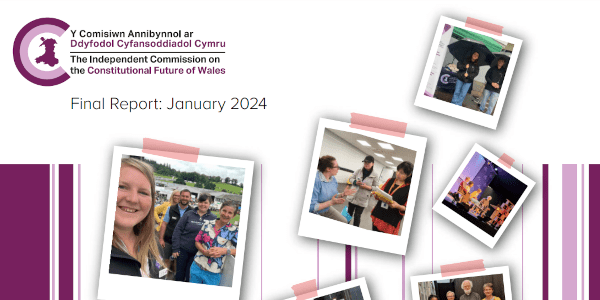“Nationalism can be a destructive force when it promotes intolerance and division. But it can also be a force for good, when it seeks to defend local autonomy against the homogenizing forces of larger entities.” – Maxime Bernier
(This blog post previously appeared in Common Weal’s weekly newsletter. Sign up for the newsletter here.)

At the last UK General Election, the party that would go on to form the Government made a manifesto promise to increase police numbers across the whole of the UK. It was a popular policy and probably won a few votes, but there was a problem with meeting that policy. Policing is a devolved matter. The UK Government only has control over the police in England. They could, of course, invest heavily in police numbers and that investment would increase the Block Grant sent to devolved nations but there’s absolutely no guarantee that the money would be used to increase the number of cops in Scotland. There would be a certain amount of political pressure to “pass the money on” as intended and that pressure has certainly been sufficient in the past, but the structure of devolution means that the Scottish Government has the absolute right to spend the money on anything it sees fit. This makes perfect sense as the needs and demands of policing in Scotland might well be very different from that in England as might the style of policing – Scotland simply may not want or need a highly militarised, American style force designed to suppress any thought of democratic protest. Anyway, the people of Scotland didn’t vote for the policy at the last Scottish election so there was no mandate to act at all.
Westminster’s defence was that it simply didn’t trust the calibre of politicians in Holyrood to act responsibly and it didn’t really matter what they thought given that they were either safely compliant or could be written off as merely the opposition complaining for the sake of complaining (damned if you do; damned if you don’t). The UK Government really wanted to meet that manifesto pledge however and decided it wouldn’t look good if the devolved nations resist their will so it took steps. Three options were available. They could, with ease, simply pull the powers over policing away from the Scottish Government and place them in the hands of the UK Justice Minister. All that would take is a simple majority vote in the Commons, which they could easily whip through. The second option was to ring-fence the funding – to simply tell the Scottish Government that they weren’t getting it unless they promised to use it as the UK Government wanted. Finally, they could outright threaten Holyrood with “financial penalties” if they tried to divert the money elsewhere.
If this happened, I’m sure that Holyrood’s response would be similar to yours – one of democratic outrage and calls for Westminster to back off and stop stepping on the toes of devolution. How dare they even make a manifesto promise that lay outwith their powers?
Do we all share the same outrage when the Scottish Government does something similar to Scottish Local Authorities?
Scotland is one of the most centralised states in Europe (especially as we don’t have an actually-local tier of municipal government – our “Local” Authorities would be called Regional Government almost everywhere else in Europe). In fact, if Scottish independence resulted merely in all reserved powers at Westminster transferring to Holyrood then a single national Government would directly control more than 85% of all public spending in Scotland. This figure is even worse when we consider the amount of money that is ring-fenced by Holyrood and merely administered by Councils. Holyrood has in recent years directly threatened Councils with withheld funds unless Councils used their powers over one of the few taxes that they actually control to maintain the Council Tax freeze and, just last week, has actively threatened to fine Councils unless they use money as directed to boost teacher numbers. Meanwhile, John Swinney’s recent budget stated that he was using Holyrood’s powers “to the maximum extent that is responsible” which carries the implication that using Holyrood’s powers to pass reforms to Local Authority tax raising powers would be “irresponsible”.
This week, Scottish Local Authorities having been negotiating their budgets for the year. It’s a grim process. Folk I’ve spoken to in several councils and across multiple parties have been essentially saying that they’re being put in the position of either breaking the law by not passing a budget or breaking the law by passing a budget that causes active harm to people because of the inevitable cuts to social services. After years of “trimming the fat”, then “cutting to the bone”, Councils are at the point of outright amputations – simply closing down leisure centres or stopping care services for folk who need them. If you’ve seen more potholes in your local roads due to the last rounds of cuts then we might expect them to not get repaired or to get worse in coming years.
The strictures of Devolution are tight but they are not nearly as tight as the Scottish Government have implied. Whenever groups like ourselves have campaigned for the broadening of the Scottish tax base via tools like Council Tax reform, land taxes, wealth taxes or pollution taxes, we’re told that the Scottish Government doesn’t have the power to do so. This is only a half-truth. These taxes cannot be implemented as national taxes controlled by Holyrood and where the revenue flows to Holyrood, but many of them can be implemented if they are done so as local taxes where the revenue flows to the relevant Local Authority.
In 2013, the Scottish Government made its pledge towards treatment of Local Government, including promises of maintaining subsidiarity and local decision-making. More recently, they have pledged a reform of local government finances, guided by a Citizens’ Assembly, by the end of this Parliament though they’ve also made it clear that the reforms themselves would only be implemented beyond the next electoral horizon (should they be in power to do so). It is likely far too late now to give Local Authorities the powers to avert a budget crisis this year and I’ve yet to see willingness from Government to spend their way out of this hole – we’ll see soon what the implications of that will be – but this only heightens the urgent need for reform of Scotland’s finances and democratic frameworks to make them more sustainable and to avoid this kind of crisis in the future. Enabling legislation should be passed as soon as possible to give Councils more control over their own finances and to set local taxes as they deem appropriate, including in areas such as wealth, land and pollution.
With the resignation of Nicola Sturgeon this week and the SNP now likely to fight a leadership contest that hasn’t been seen in the party essentially for decades, it would be worth all candidates considering their pitch not just as one where they believe that they are the best personality to lead the party and, likely, the country but also one where they consider their policy pitch and agenda for their tenure. I will be watching closely to see if any of the candidates promise to uphold and accelerate those pledges. Who knows, we might even end up with something really radical – like the kind of truly local democracy that almost all of our peer nations in Europe simply call “normal”.











